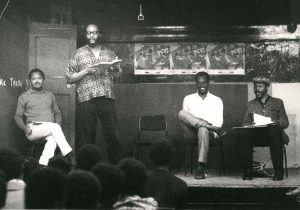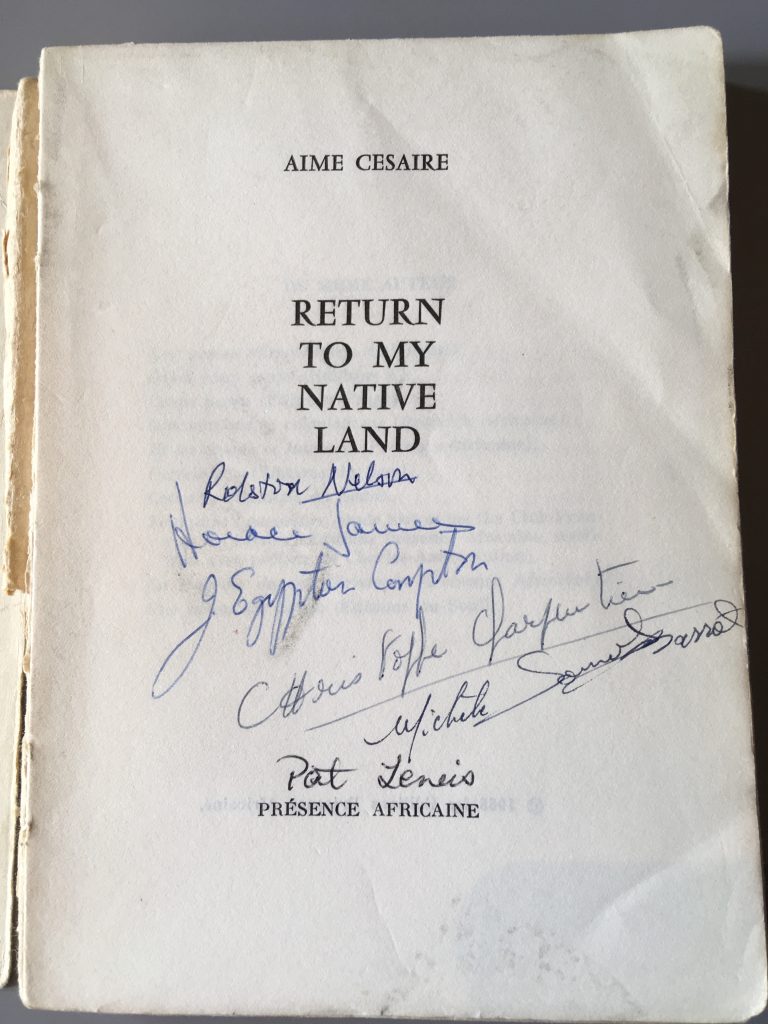Written by guest blogger Jacob Edmond.
Fifty years ago this June an extraordinary reading took place in London. John La Rose brought together a Caribbean cast for a staged bilingual French-English performance of Aimé Césaire’s Cahier d’un retour au pays natal (Notebook of a Return to the Native Land).
Audio Credit: A Reading of Cahier d’un retour au pays natal, by Aimé Césaire. Directed and introduced by John La Rose. Read by Gayle Nelson, Pat Lewis, Michele Soumah Barrot, Horace James, Christophe Charpentier, Keefe West, Rolston Nelson, Jacques Compton, and John La Rose. London, 6 June 1969. Audio cassette no. 38. Caribbean Artists Movement Archive, CAM/9/1/2/40. George Padmore Institute, London.
The 1969 bilingual reading not only marked the thirtieth anniversary of the first publication of Césaire’s revolutionary poem; it also arguably represented a highpoint in the collective artistic and intellectual efforts of the Caribbean Artists Movement. The bilingual performance spanned one of the Caribbean’s main linguistic and political divisions—a legacy of colonialism that the Caribbean Artists Movement sought to overcome. The reading also embodied the Caribbean Artists Movement’s emphasis on the diverse patterns of speech in the Caribbean. It brought together performers with the distinctive speech of several islands, including Césaire’s “native land,” Martinique. One of the founders of the Caribbean Artists Movement, Kamau Brathwaite, would later term these various speech patterns “nation language” to emphasize their importance to the postcolonial cultural and political independence that the Caribbean Artists Movement sought to foster and to celebrate.
 Image Credit: John La Rose, Kamau Brathwaite, Marc Matthews and T-Bone Wilson at a Caribbean Artists Movement poetry reading, date unknown (late 1960s or early 1970s). Photographer: Vanessa Stamford. John La Rose Archive. George Padmore Institute, London.
Image Credit: John La Rose, Kamau Brathwaite, Marc Matthews and T-Bone Wilson at a Caribbean Artists Movement poetry reading, date unknown (late 1960s or early 1970s). Photographer: Vanessa Stamford. John La Rose Archive. George Padmore Institute, London.The reading, under La Rose’s direction, involves a beautiful weaving in and out of French and English, overlaying and augmenting the complex system of repetitions and variations that is Césaire’s poem. I discuss the performance in my essay “Global Rhythms: Setting the Stage for World Poetry in 1960s London,” just out from the University of Toronto Quarterly.
For fifty years this reading has been almost forgotten and might have been forever, had it not been for the prescient archival instincts and technological savviness of the Caribbean Artists Movement’s founders, including La Rose and, especially, Doris and Kamau Brathwaite. When the Caribbean Artists Movement was founded in London in 1966, the Brathwaites insisted that practically every public event and discussion be recorded. Their efforts yoked the librarian Doris’s instincts as an archivist with Kamau’s (then Edward’s) instincts as a poet and lover of new technology.
Kamau Brathwaite’s experiments with tape recording had begun over half a decade earlier. I have written elsewhere (in my book Make It the Same) about how Brathwaite used tape to compose his ground-breaking epic poem, The Arrivants. But his and Doris’s use of the tape recorder to create an audio archive of the Caribbean Artists Movement was arguably just as significant an achievement in the history of Caribbean culture.
 Image Credit: The title page of the bilingual edition of Cahier d’un retour au pays natal (Présence Africaine, 1968) signed by the majority of the readers in the 1969 performance. La Rose used and heavily annotated this copy in preparation for the performance. John La Rose Archive. George Padmore Institute, London.
Image Credit: The title page of the bilingual edition of Cahier d’un retour au pays natal (Présence Africaine, 1968) signed by the majority of the readers in the 1969 performance. La Rose used and heavily annotated this copy in preparation for the performance. John La Rose Archive. George Padmore Institute, London.
A year ago I visited the wonderful George Padmore Institute, where copies of these tape recordings, collected by La Rose and others, are now housed. The George Padmore Institute sits above New Beacon Books, Britain’s first black publisher and bookshop. La Rose founded New Beacon Books in 1966 and played a key role in the establishment of the institute. Thanks especially to Sarah White (John La Rose’s wife and collaborator) and Sarah Garrod (the institute’s archivist), I was able to listen to the Caribbean Artists Movement recordings and to assist the institute in making digital preservation copies of this historic tape collection.
Thanks also to their generous support and permission, here in this blog post, for the first time outside the archive and a very few private tape collections, you can listen to a sampling of the 1969 performance of Césaire’s poem. The sample includes La Rose’s introduction, which I also cite and discuss in my essay.
Jacob Edmond is an associate professor in English at the University of Otago, New Zealand. He is the author of Make It the Same: Poetry in the Age of Global Media (Columbia University Press, 2019) and A Common Strangeness: Contemporary Poetry, Cross-Cultural Encounter, Comparative Literature (Fordham University Press, 2012). His essays have appeared in such journals as Comparative Literature, Contemporary Literature, Poetics Today, Slavic Review, and The China Quarterly. Read his latest article in the University of Toronto Quarterly entitled “Global Rhythms: Setting the Stage for World Poetry in 1960s London” free for a limited time.
Comments on this entry are closed.